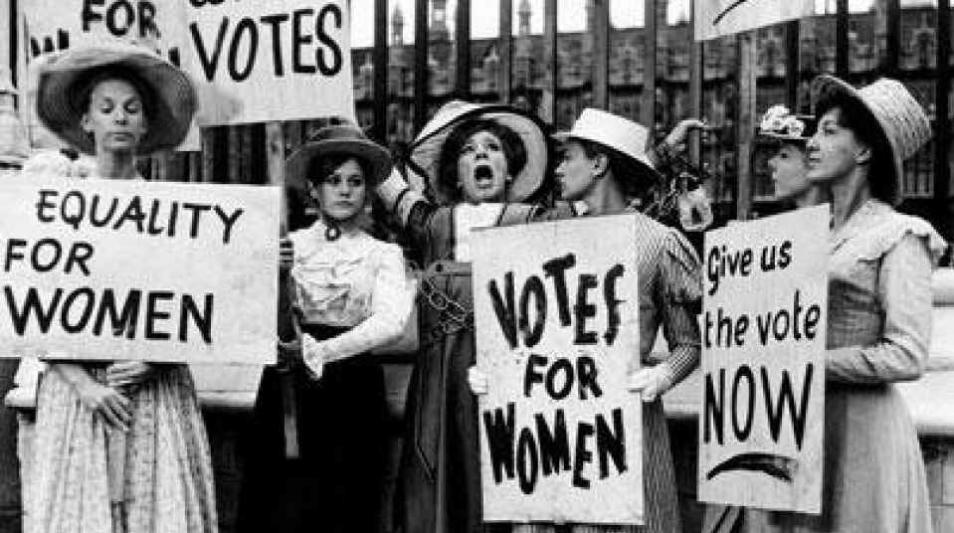Did you know that 100 years ago, women were not only not allowed to vote, but they also couldn’t divorce, wear pants, join the military, keep their maiden name, smoke in public, own property if they were married, shop without an escort, work fair hours, serve on a jury, compete in a wide level of Olympic sports, or have their own passport if they were married.*

In Michigan, women petitioned the legislature for the ballot as early as 1855. After the Civil War, women won limited school board suffrage. Suffragists continually fought for expanded voting rights but saw repeated state constitutional amendments and ballot initiatives defeated over the next decades.
During a special session in June 1919, the Michigan Legislature became, on June 10, the third state in the nation to officially ratify the 19th Amendment to the U.S. Constitution (which had only been given final Congressional approval a few days earlier on June 4). In a show of overwhelming support, the all-male legislature voted unanimously for its ratification.
The amendment reads "The right of citizens of the United States to vote shall not be denied or abridged by the United States or by any state on account of sex."**
Not all women obtained the right to vote with the passing of the 19th Amendment in 1920. For instance, in 1920 Native American groups were yet to be granted U.S. citizenship which prevented Native American women and men from voting. Moreover, there were other barriers that women experienced that kept them from gaining access to vote such as literacy tests, poll taxes, and other suppression tactics that disproportionately affected women of color.***
Here in Lansing, the Michigan Women’s Historical Center and Hall of Fame is located at 105 W. Allegan St. #10 and is home to the Michigan Women's Hall of Fame featuring nearly 300 inductees past and present.
A sampling of notable Lansing women include:
Through her contributions to education in Lansing and being the first African American to teach in the district, Dr. Letts dedicated her life to increasing access to teach for future teachers of color. While Principal in the district, she positioned herself to pave the way to launch city-wide efforts to end segregation in Lansing Public Schools.
Mary Ellen Sheets turned a family pickup truck into the worldwide “Two Men and a Truck” empire with franchises in 37 states, Canada, England and Ireland. In 2014, the company logged its five-millionth move.
Marylou Olivarez Mason, the founder of Michigan Hispanic Heritage Month served with both Democratic and Republican governors. In 1986, she was the first woman to be named executive director of the Michigan Commission on Spanish-Speaking Affairs by Gov. James J. Blanchard. Dr. Mason was honored as Hispanic Woman of the Year in 2000 by the National Hispana Leadership Institute in Washington, DC. In 2005, Dr. Mason received the highest award the Mexican government bestows on an individual outside Mexico.
Elizabeth Lehman Belen was the first woman and the first Democrat elected to the State House of Representatives from her Lansing district. Belen was the second woman ever elected to the Michigan House and was a charter member and president of the National Order of Women Legislators.
Paula Cunningham became Lansing Community College’s first female president. While leading the ninth largest single campus community college in the nation, Cunningham successfully led a millage increase to support the college and funding for LCC’s five new buildings, including an alternative energy initiative. She also forged partnerships with other academic institutions and businesses to build a new University Center which created additional educational access for students. She was also the first female president and CEO of Capitol National Bank. During her tenure, Cunningham successfully led the bank through Michigan’s worst recession in 70 years. She is also the first African American woman to be chair of the Lansing Regional Chamber of Commerce.
Dedicated to the struggles of the poor and vulnerable, Johnson, a clinical psychologist, was the principal owner of the East Lansing Center for the Family and was the Director of the Human Relations and Community Services Department (HRCS) for the City of Lansing beginning in 2006.
Dr. Gladys Beckwith was a pioneer in the fields of women’s studies and women’s history. As one of the first professors of women’s studies in the country, Dr. Beckwith was frustrated by the glaring lack of course materials for and about women. In 1973, she and a small group of colleagues formed the Michigan Women’s Studies Association (MWSA), the first professional women’s studies association in the country.
Born in DeWitt, Martha Strickland was the first woman to argue a case before the Michigan Supreme Court. By her early 20s, Martha was an orator on women’s suffrage, temperance, and finance.
Educated and experienced in the administration of college-level education, Abigail and her sister Delia Rogers determined to open a school of the highest grade for young women in Lansing (The Michigan Female College) Upon her death in 1869, the Lansing Republican newspaper called Rogers “the acknowledged and leading champion of the higher education of women in Michigan.” Later that year, Michigan Agricultural College (now Michigan State University) admitted its first female student. The University of Michigan followed suit in 1870.
Debbie Stabenow made history in 2000 when she became the first woman from the State of Michigan elected to the United States Senate. She is the only woman U.S. Senator to have been elected to local office, both houses of her State Legislature, and to both the US. House of Representatives and U.S. Senate.
As a child Babe spent a great deal of her time at the Lansing airport watching the planes, taking photos, and getting autographs of pilots. In 1933 she received a response from the famed pilot Amelia Earhart telling Babe that if she worked hard, she, too, could be a pilot.
A pilot and instructor, she became one of the Midwest’s most respected authorities on aviation. She was one of just five civilian women who taught instrument flying to male military pilots using the Link Trainer, the precursor of today’s flight simulators. She worked as a flight instructor for years, one of the few women instructors in the US.
Canady was the first African American elected to the Lansing Board of Education. She served with distinction until she was one of the five members of the board recalled by the Citizens for Neighborhood Schools. The quality of her leadership stood out in a time when the community was bitterly divided over school integration. She was founder of Les Meres, a group that brings together mothers and daughters from the seventh to twelfth grade, and a charter member of the Lansing chapter of Links. She later became the first executive director of the Lansing Community College Foundation.
Dr. Alexa Canady was the first, youngest, African American woman neurosurgeon in the United States and served as Chief of Neurosurgery at Children’s Hospital in Detroit. At the time of her induction into the Michigan Women’s Hall of Fame in 1989, she was one of only about 50 female neurosurgeons in America, and one of about 10 who specialized in pediatrics.
Local Organizations Recognized
American Legion NUWARINE Post 535 is Michigan’s last remaining all-female American Legion Post. Post 535 was organized on November 25, 1946 in Lansing, Michigan by a group of 22 female WWI and WWII veterans who felt they should have their own American Legion Post. The name “NUWARINE” is an acronym taken from the organizational branches of the charter members (Army/Navy) NUrses, WAves, WAcs, WAfs, spARs and marINES (USMCWR).
Since its inception, the club has met the needs of hundreds of girls and has welcomed the daughters of former debutantes. The club’s alumni include many successful women such as Alexa Irene Canady, the first and youngest African-American woman neurosurgeon in the United States and a 1989 Michigan Women’s Hall of Fame Inductee; Anita Riddle-Johnson, the first African- American woman General Motors Executive from Lansing; and Luanne Wills-Merrell, the first African-American female aviation safety inspector hired by the Federal Aviation Administration.
*https://www.rd.com/list/things-women-werent-allowed-to-do-100-years-ago/
**https://www.michigan.gov/libraryofmichigan/0,9327,7-381-88854_89996-518343--,00.html
Photos and text courtesy of Michigan Women Forward, Michigan Women's Hall of Fame (HERstory)


















